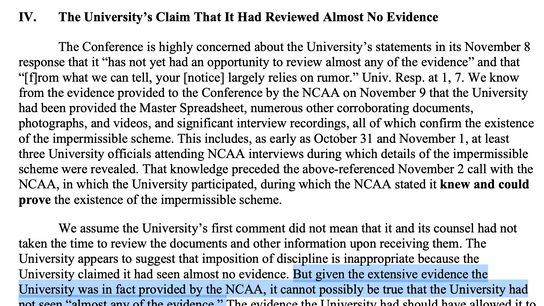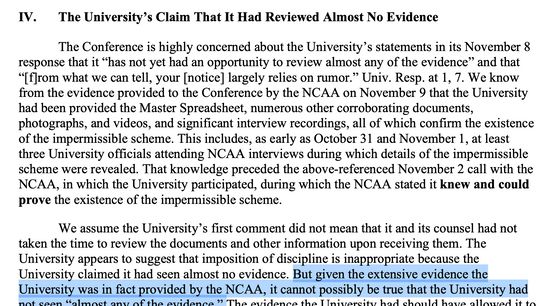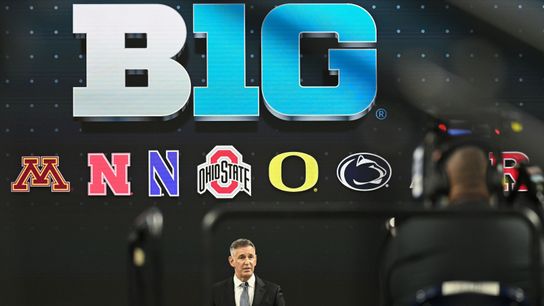In case the Big Ten Conference's three-game suspension for disgraced Michigan coach Jim Harbaugh wasn't clear enough, consider the blunt view the conference office took Friday as it handed down Harbaugh's punishment.
In a 13-page letter that the Big Ten sent to Michigan officials, specifically athletics director Warde Manuel, the league office and commissioner Tony Petitti outlined in no uncertain terms that Michigan both had not denied the alleged elaborate, well-planned sign-stealing, in-person scouting, spying scheme of Connor Stalions on behalf of Harbaugh's Wolverines program but that Michigan had not disputed these findings.
"The University’s November 8 response does not deny that the impermissible scheme occurred. Instead, it offers only procedural and technical arguments designed to delay accountability. The University also argues that because it believes that others are engaged in decoding signs, there must be nothing wrong with the University’s activities. In addition to impermissible activities of others being currently unsupported by facts, the University’s culpability is not dependent on the actions of other institutions."
In handing down this immediate three-game suspension to Harbaugh, who will be allowed to still coach his team throughout each week, this fact is undeniable: Jim Harbaugh is slated to be suspended for half of Michigan's 12-game season after serving a school-imposed three-game suspension to begin the year and now seeing the Big Ten mandate Harbaugh be shelved for the Wolverines' final three regular-season games.
Moreover, the Big Ten document states in no uncertain terms that it has found Harbaugh's Michigan program culpable of cheating and of breaking the standards of sportsmanship that make "integrity of competition the backbone" of any sports league or conference, in this case the Big Ten.
"Enforcing the Sportsmanship Policy with appropriate discipline this season in light of the University’s established violations this season is thus of the utmost importance to protect the reputation of the Conference and its member institutions and to ensure that our competitions on the field are honorable and fair."
The explosive letter from Petitti to Manuel, who like Harbaugh is a Michigan alum and former Wolverines football player, revealed that the rules-breaking, cheating in Harbaugh's Michigan program was so extraordinary that the case necessitated a watershed-moment of action from the NCAA.
In fact, the letter reveals that the NCAA informed the Big Ten office and other pertinent parties about its ongoing investigation into Harbaugh's Michigan program because of its direct potential to continue to have possible influence and impact on the second half of the college football season:
E. The NCAA Provides Its Evidentiary Conclusions to the University and the Conference About the Scheme
On November 2, a senior Conference staff member and I participated in a call with NCAA President Baker, other senior NCAA staff members, and the University’s Athletic Director, General Counsel, and outside counsel. During that call, the NCAA informed the Conference and the University that, based on its investigation and the evidence it had collected, the NCAA “knew and could prove” the following:
• the staff member participated in and coordinated a vast off campus, in-person
advance scouting scheme involving a network of individuals;
• he purchased and forwarded tickets for games involving future University football
opponents, and the tickets were for seats strategically located for stealing the future
opponents’ signs;
• he and others acting at his direction video recorded signs used by future University
opponents while attending the opponents’ games in person;
• information, including videos of future opponents’ signs, was delivered back to the
staff member by those who had attended the games and taken the videos at his
direction; and
• during the time in question, including through the University’s seventh game of the
2023 season, the staff member was present on the University’s sidelines, dressed
similarly to University coaches, in close proximity to University coaches, and he
communicated directly with such coaches.
From Page 12 of the letter:
Another factor that the Commissioner may consider is “any injury or damage that results from the offensive action.” Separate from both the damage to the reputational integrity of the Conference and its member institutions and damage from past and ongoing competitive disadvantage, physical injury is also a significant concern here. While the Conference is currently not aware of any physical injuries that resulted from the impermissible scheme, numerous coaches and athletic directors from other member institutions expressed concerns to me about the increased risks of injury to student-athletes resulting from the scheme. I have a responsibility to give serious consideration to those concerns. I find it credible that impermissible advance scouting increases the risk of injury to student athletes because if you know what play your opponent is running, then you also know where your opponents’ players will be on the field. Although the University attempted to downplay and disregard these safety concerns in its response, I am not willing to do so.


The Big Ten's entire 13-page response from Petitti to Manuel/Michigan can be found here: BIG TEN SLAMS MICHIGAN IN LENGTHY RESPONSE LETTER
